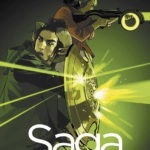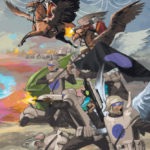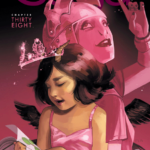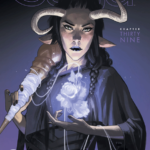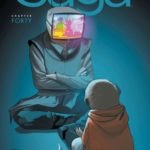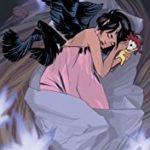Only five more days until the Hugo Award ceremony, time for one more nominee review!
Writer Brian K. Vaughan and artist Fiona Staples are still telling the story of an average family (average here meaning uniquely dysfunctional and totally alien, just like every family in existence) in the middle of a galactic war, and the series just keeps getting better and better. You won’t get the full effect if you don’t read the series from the beginning, but if you need a fairly self-contained chapter to start with then this might be a good pick, since Volume Seven covers the entire “War for Phang” storyline.
Running low on fuel for their tree-house-turned-spaceship, Hazel’s newly-reunited family touches down on Phang, a comet-settlement that the factions in the war between Wreath and Landfall have been fighting over for decades. A quick stopover turns into a six-month stay as the family makes friends with fellow refugees, prepares for the upcoming birth of Hazel’s little brother, and basically enjoys the first peaceful time they’ve had since before Hazel was abducted five years ago.
You just know that the quiet won’t last long…
Good holy God, where do I even start with this series? It’s profane and earthy. It’s violent and uncomfortable. It’s filled with rapid-fire smart-alek dialogue, and it’s damn near poetic in places.
And it’s weird.
I suspect Vaughan and Staples have a competition where Vaughan invents the strangest alien race he can come up with, and then Staples illustrates it in a way that can be beautiful, and also takes the concept so much further than anyone would have imagined. And as strange as the results are, it’s also somehow believable that everyone in this story would just accept this strangeness as totally mundane, instead of saying “WTF” a hundred times a day.
In addition to living in a tree-spaceship that’s at least partly sentient, Hazel’s family-by-association includes the elegantly beautiful and always angry Wreathian Petrichor, the former Prince Robot IV from a separate race of Landfallians who have a working TV for a head, and Hazel’s sassy babysitter Izabel who’s a shapeshifting ghost of a landmine victim and who usually appears as the upper half of a teenage girl floating over her own spilled intestines. You heard me.
Hazel’s mother Alana is an army deserter from the planet of Landfall (all Landfallians have wings, and they can be any type of wings, from hawk to butterfly to Alana’s surprisingly powerful dragonfly wings), while her father Marko is a former prisoner of war from Wreath (where everyone is horned, including Marko’s ram horns and we even see a couple of characters with a unicorn horn). As the daughter of two different races (on opposing sides of the war), Hazel is the only person in the whole galaxy with both wings and horns.
Since Hazel’s very existence means that the war between Wreath and Landfall is even more meaningless than everyone already thought it was, the family has become the target of terrorists, journalists looking for the story of a lifetime, and bounty hunters secretly hired by one side of the conflict or the other. The war has long since wandered away from the two main planets, it’s drawn in dozens of other worlds and created literally millions of refugees. And we see in this volume that the two sides have no problem making deals with their enemies from time to time, even if it results in the deaths of thousands of their own citizens.
With all that in mind, what are Alana and Marko doing to expose the corruption of their homeworlds’ leaders and end this unjust war? Very little. They’re surviving, moving from refuge to refuge, snatching a few moments of happiness wherever they can, and trying to give their daughter as normal an upbringing as possible.
And that’s the point. That’s the entire point. Find one family in the middle of Afghanistan or Yemen or the gang violence in South America and ask them what they’re doing to stop the war, and you’ll probably get the exact same answer. For every single conflict in this world you’ll find leaders with their own agenda calling the shots from the rear, soldiers and patriots who passionately believe in a cause, and millions of everyday people trying to do something as mundane as picking up groceries when they’re caught in the crossfire.
Sure, there are moments in Saga of extreme danger and a distressingly high body count. This volume includes the tragic death of a character we’ve known almost from the start (Hazel is the only character who’s really safe, since she narrates the series from some point in the far future, although I wouldn’t put it past Vaughan to find a loophole for that as well), and also the not-tragic, well-deserved death of a character we only knew for maybe two issues. Who I didn’t even like. And somehow it still hurt when they died. But for the most part the story is about the moments in between all that: family dinners, pre-teen tantrums, the killer t-shirt you got at your favorite band’s concert, childhood friendships and first love.
And of course since this is Brian K. Vaughan, the volume has an absolute gut-punch of an ending. The last six pages are some of the most uniquely powerful storytelling I’ve seen, although like the rest of the series you’re going to have to read the entire story to get the full effect.
And that’s it for the Hugo nominees, we out! Check out Pixelated Geek for an updated list of the finalists, and we’ll see you on Sunday the 19th on the Binary System Podcast Facebook page for a (hopefully) live rundown of the winners.
